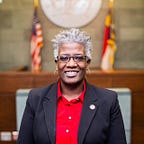Get to Know DCDAO: Courtroom 4D
Get to Know DCDAO is an occasional series about the people who make up the Durham County District Attorney’s Office. This installment focuses on staff who work to find just resolutions to a high volume of misdemeanor cases in District Court Courtroom 4D.
Every day, anywhere from 50 to 180 criminal cases come through Courtroom 4D at the Durham County Courthouse.
Most days will find Assistant District Attorneys Sammy Said and Ahmed Adam and intern Michael Wilcox in the packed District Court courtroom. Said has worked at the DA’s Office since July 2018, Adam since June 2019, and Wilcox — a third-year law student at North Carolina Central University — since May 2019. They’re all part of the Durham County District Attorney’s Office Drug and Property Crimes team, which is led by Assistant District Attorney Daniel Spiegel.
Court opens in 4D at 9:00 a.m. and each name on the day’s calendar is called out. Next, first appearances are conducted — in which people charged with crimes are asked whether they will hire an attorney, represent themselves, or seek court-appointed counsel. After that, a range of court proceedings may take place — from motions to pleas and trials.
Getting through the lengthy, fast-paced docket requires coordination between Adam, Wilcox and Said.
One works through a stack of envelopes containing documents for each case on the docket, communicating the status to the judge. Another marks each envelope with a new court date if the case is being continued to another day. The third sits behind a laptop, looking up information, like police reports and criminal records, to help determine a fair disposition for cases being resolved that day.
Most of the charges are misdemeanors, although felonies start in District Court before being referred up to Superior Court. Among the most common charges handled in 4D are trespassing, shoplifting, assault, and possession of drugs and drug paraphernalia.
With the help of lead traffic ADA Dale Morrill, the 4D team is working to streamline proceedings by approaching cases proactively and meeting with defense attorneys before court to reduce time spent on negotiating and scheduling once proceedings begin. The goals are to ensure both victims and defendants are well-served by the court system and to save time for everyone involved in a case, including court personnel. Moving cases efficiently is crucial in 4D — under local rules, District Court matters have to be resolved within 120 days.
Victims of crimes often have questions about why their case has a particular outcome, Spiegel says. To make sure they trust they’re being treated fairly, the prosecutors may talk to victims about how they want to see a case handled, how similar cases have been resolved, and how North Carolina’s structured sentencing laws guide what sentence a person can receive based on charge and prior record level.
Not everyone who comes through 4D is legally entitled to an attorney, so it’s also important for the prosecutors to make certain defendants are informed, too. Under North Carolina law, people have a right to counsel if their charges could lead to incarceration or a fine of $500 or more. Those who are facing a Class 3 misdemeanor — the lowest class — and have fewer than four prior convictions are not entitled to an attorney. In those cases, prosecutors take extra steps to ensure people are aware of the potential consequences of their charges and the benefits of hiring a lawyer if they can.
While Superior Court — with its long trials and high-level cases — may get more attention, District Court courtrooms like 4D have a significant impact on communities. Other than traffic court, most people who come to the Durham County Courthouse find themselves in 4D. Even though the crimes addressed there are classified as lower-level, a victim may still be deeply impacted, Said says.
“When you hear misdemeanors, you might think they aren’t that serious, but there’s still a real victim,” says Said.
As Adam points out, misdemeanor convictions can still carry jail time or have collateral consequences for housing, employment, immigration, college admissions, or professional licensing. People might overlook these consequences and plead guilty, believing that’s the quickest way to resolve the matter.
“A misdemeanor is not a joke, especially for a young person’s life,” says Adam.
The 4D prosecutors try to find ways to resolve cases that avoid creating these kinds of consequences for defendants — especially when he or she is young — while making victims whole. This might include doing community service, taking educational courses, undergoing substance use treatment, or paying restitution. In a recent case, a victim wanted an apology from an elderly woman with dementia who stole something from her porch.
As part of a larger goal by the Durham County District Attorney’s Office to prioritize serious crimes, prosecutors use their discretion to decline to prosecute or divert low-level offenses in which the costs of court involvement outweigh the benefits to public safety. These efforts are often felt in Courtroom 4D.
“From a policy perspective, a lot of what we’re doing in 4D is trying to address issues around poverty, mental illness, and crimes of desperation,” says Spiegel.
Note: ADA Sammy Said has taken another opportunity with the state since the writing of this article. The Durham County District Attorney’s Office wishes him the best of luck in his new role.
